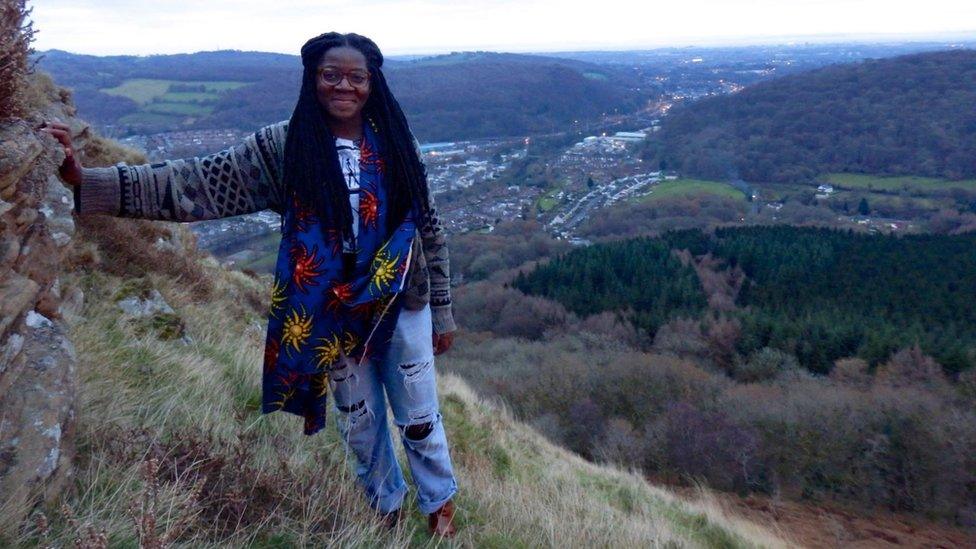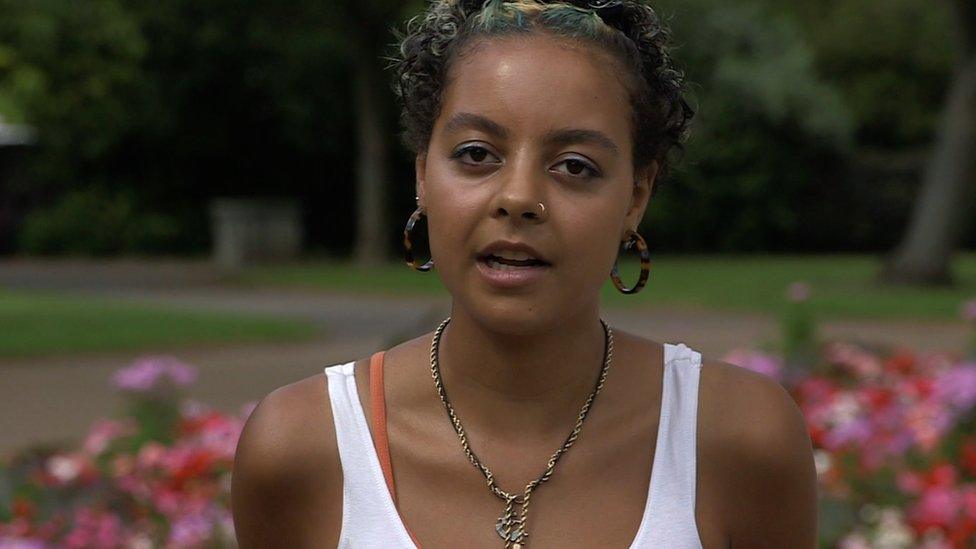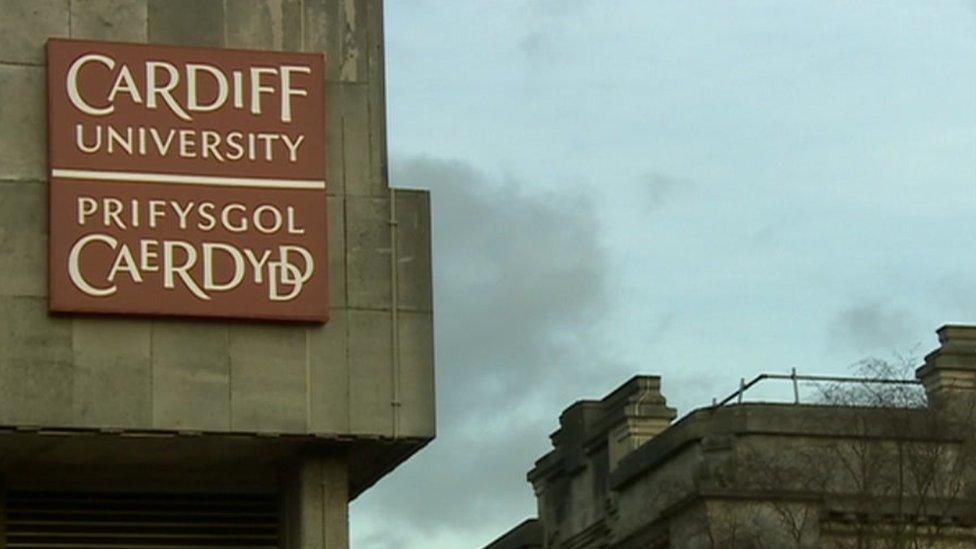Black Lives Matter: Cardiff Uni racism row student seeks legal advice
- Published
"I felt unsafe walking down the street," says former Cardiff University student
A former Cardiff University student is seeking legal advice on how it dealt with a racism complaint.
Natasha Chilambo, 25, was one of eight black students to complain when a fellow student wore blackface as "a stereotypical, hyper-sexualised black man" in a 2016 play.
She felt "isolated" and "paranoid", one student attempted suicide and another could not attend lectures.
The university apologised for the "pain and upset" caused.
It added it had held an independent inquiry.
Natasha, from Swindon, said she suffered from insomnia and stopped eating in the aftermath of the incident, and eventually had to leave the university and complete her training in London.
She was one of eight black medical students in their third year at Cardiff Medical School when the annual Anaphylaxis charity play took place in 2016.

Natasha Chilambo has crowdfunded nearly £6,000 for legal funds
That year, one of the students who took part in the play impersonated the only black lecturer at the university's medical school, by performing blackface and wearing a black sex toy around his waist. The play also included other racist, sexist and homophobic jokes.
This led to the eight black medical students in Natasha's year making a confidential complaint to the university in February as a group. They also asked for a public apology.
The 31 medical students who took part in the play were immediately suspended from clinical placements after breaching the university's student behaviour expectations, but they were later permitted to return.
'The university could have done so much more to protect us'
BBC Wales has spoken to three of the students who complained, who felt the university did not deal with the complaint or support them adequately.
One of the three, who has asked to remain anonymous, said the fact eight black students had made a complaint was made public by the university - effectively removing their anonymity in the process.
She said: "People did the maths. Out of 300 medical students in the year only eight were black. People essentially started to hate us.
"I'd stopped going to lectures because I couldn't face meeting or being in a room with so many other people who I knew didn't appreciate [me] or were angered [by me] at standing up for what was right."
She added: "The university could have done so much more to protect us."
Cardiff University said the letter had originally been shared so those involved could see the full allegations being raised.
The university arranged for the students in the play to write letters of apology, but the complainants said these were only available to view at a certain time and place under condition they would not disclose the contents.
Cardiff University said there was an "open invitation" to read the letters, and that they formed one part of a restorative justice process, which offered support to those who had complained, and engaged everyone involved to "try and help repair relationships".
A spokesperson for Cardiff University said a "wide range of support" was provided which included "supporting members of the complainant group to move house, change clinical placement locations, access counselling and support".

The university said it recognised it had failed to foresee the depth of reaction and feeling amongst the medical cohort of students
They added: "What the university does recognise is that it failed to foresee the depth of reaction and feeling amongst the medical cohort of students and that we were unable to influence or intervene in a manner that was able to prevent the very deep hurt caused by the breakdown in friendships and peer group relationships that we know impacted so heavily on some members of the complainant group."
The three complainants said the way the complaint was dealt with led to a decline in their mental health.
Natasha said: "I couldn't walk down the streets in Cardiff without feeling unsafe, without panicking about who am I going to meet, are they going to be the students in that play?
"I couldn't do that any longer and ended up having to leave the medical school."
She moved to Kings College London to complete her studies.
But when Cardiff University tweeted about the death of George Floyd earlier this year stating "racism and discrimination have no place in our modern society" it brought it all back.
Natasha said: "I remember thinking, how can you make such a bold declaration around this space when students who are there now and have been in the past have told you for years that they face racism?"
Legal moves
It prompted her to consider legal action over the way her complaint was dealt with in 2016. She has raised nearly £6,000 on GoFundMe for legal fees.
Natasha said moving on would be the easier option, but that she wants to make things better for black students in the future.
She said: "We have to create a culture where people are held accountable for their actions that are harmful, where there is the space to say 'you caused me harm'.
"We have to create a culture that empowers, encourages and supports people when they say these things are wrong, or otherwise they carry on and that's not good enough."
The university said it conducted an Independent Review Panel to examine how it's responding to institutional and cultural barriers that exist for minority ethnic students and staff.
It said the School of Medicine is working with student societies the African Caribbean Medical Association, Cardiff Healthcare International Perspectives and MedSoc to develop a Student Staff Race Equality Task Group.

Yemi Sawyerr said she didn't think black students were supported enough
But some black students at Cardiff University still say they feel unsupported by the institution, four years after the play.
Yemi Sawyerr, from London, has finished her second year at Cardiff Medical School.
Yemi, 20, said: "Given that the university is predominantly white, I don't think that black students are supported enough."
She said in equality and diversity training she was told to explain why racism is wrong if a patient was racist to her.
Yemi said: "I think the onus is on us to deal with it and fight, rather than on the uni."
Earlier this year students at Cardiff School of Dentistry complained to the university of "racist behaviour and unconscious bias" from some teaching staff, fellow students and patients.
The authors claimed black and ethnic minority students have been mocked and subjected to racist language.

The university said it had "learnt many lessons" following the incident and complaint
The university said it accepted there were failings in the handling of the 2016 Anaphylaxis play, and it had "learnt many lessons" and had taken action to address issues such as creating a central incident group to ensure a "consistent approach to complaints of racism".
A spokesman said: "The vice-chancellor took the unprecedented step of commissioning an independent and expert panel to review issues of racism in the institution. The panel was given complete access to all available information and was supported to interview staff and students.
"The independent report was published and made a series of recommendations which were accepted in full and their implementation was led by a dedicated member of staff reporting to the deputy vice-chancellor.
"The issues of racism raised by the event are taken extremely seriously and at the most senior level of the organisation as we continue to work to ensure a cultural transformation across the university."
- Published8 June 2016
